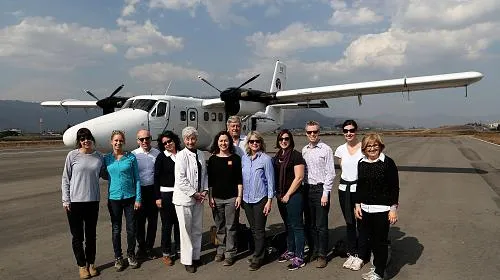Members of Congress see how U.S. development investments are resulting in healthier moms and families
WASHINGTON (Feb. 19, 2015) – Reps. Renee Ellmers (R-NC) and Diane Black (R-TN), both members of the Republican Women’s Policy Committee, traveled with the poverty-fighting organization CARE to some of the poorest areas of Guatemala to see how U.S. investments in maternal health are saving lives and empowering communities. The congresswomen were joined by delegates from USAID, the Bill & Melinda Gates Foundation, Hope Through Healing Hands and CNN International.
The four-day trip highlighted the successes of women who are living longer, healthier and more productive lives because of U.S investments in global development. The group visited several health programs, which showcased some of the innovative tools and services they use in their comprehensive approach to breaking the cycle of poverty.
Despite development progress since its civil war ended in 1996, Guatemala remains predominately poor and struggles with health and development indicators. More than half the population lives in poverty, and Guatemala’s maternal and child mortality rates are the highest in Central America. While Guatemala is only a three-hour flight from the United States, a Guatemalan woman is five times more likely to die in childbirth than her American counterpart.
During the trip, the group traveled to Quetzaltenango and Cobán, where they met women in rural areas who are living with daily maternal, newborn and child health challenges. Group members also visited health centers and clinics, where they met with community health workers and mothers in need of health services before, during and after their pregnancies.
“When women and children survive, communities thrive,” said David Ray, CARE’s vice president of Advocacy. “We know that many of these maternal deaths are preventable. Whether it’s through improved nutrition, proper hygiene or better spacing and planning of births, we can stop these deaths from happening.”
The journey started in the nation’s capital, Guatemala City, where the group met with the U.S. Mission and other development agencies to learn about the political and historical context in which development programs are being implemented.
The next day the delegation headed to the Western Highlands region, where high poverty rates disproportionately affect indigenous communities. The health conditions differ dramatically from more modernized parts of the country like Guatemala City. Few healthcare facilities or medical professionals are available in these communities, where language and cultural barriers also prevent indigenous families from accessing healthcare services.
In the Western Highlands region, the delegation headed to Quetzaltenango, where CARE is implementing a health program to educate indigenous mothers and families about nutrition and health issues. The program trains community mobilizers to provide basic health and nutrition education to mothers. These health workers provide a crucial link to health information, because families often lack the resources or transportation to travel far distances in order to access hospitals. These health workers also use CARE’s innovative micro-savings program – Village Savings and Loan Associations (VSLAs) – to mobilize women who then save money to cover medical expenses.
Next, the delegation visited mothers in their homes. These mothers participate in University Research Company’s Nutri-Salud program, which supports the Guatemala Ministry of Health’s efforts to expand health coverage at the community level in order to improve the nutritional status of women and children under 2.
On the third day of the trip, the group headed north to the city of Cobán to visit a government-run hospital run by the government of Guatemala. The only tertiary government hospital in the region, Cobán Regional Hospital, specializes in internal medicine, obstetrics and gynecology, orthopedics, general surgery, pediatrics and neurology. Coban has one of the highest maternal mortality rates in the country.
After the hospital visit, the group headed to Population Services International’s (PSI’s) Planfam supported by USAID. The project aims to support the Ministry of Health in reducing maternal mortality and chronic malnutrition. The program targets rural indigenous women and men between 15 and 49 years of age.
The last site visit of the trip focused on the next generation of youth in Guatemala. The group visited a trip run by Population Council. The program provides a leadership program for indigenous girls between the ages of 8 and 18. The girls form social support networks and are given access to role models and mentors who help them with life skills and professional skills training.
Participants in CARE’s February 2015 Learning Tour to Guatemala included:
- Rep. Diane Black, U.S. Congress (R-TN-06)
- Rep. Renee Ellmers, U.S. Congress (R-NC-02)
- Jenny Eaton Dyer, Ph.D. executive director, Hope Through Healing Hands
- Julie Guinan, senior writer, CNN International
- Jane Nix, senior writer, CNN International
- Doris Meissner, senior fellow and director, U.S. Policy Program Migration Policy Institute
- Kelly Saldana, deputy director, Office of Health, Infectious Diseases and Nutrition Bureau for Global Health USAID
- Tom Walsh, senior program officer for Global Policy and Advocacy, Bill & Melinda Gates Foundation
For more information on CARE’s Learning Tours, visit www.care.org/LearningTours. The CARE Learning Tours program is funded by the Bill & Melinda Gates Foundation.
ABOUT CARE
Founded in 1945, CARE is a leading humanitarian organization fighting global poverty. CARE places special focus on working alongside poor girls and women because, equipped with the proper resources, they have the power to lift whole families and entire communities out of poverty. Last year, CARE worked in 87 countries and reached more than 97 million people around the world.
Media Contacts
Stephanie Chen, schen@care.org, +1-202-595-2824

